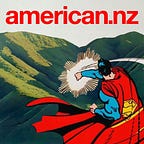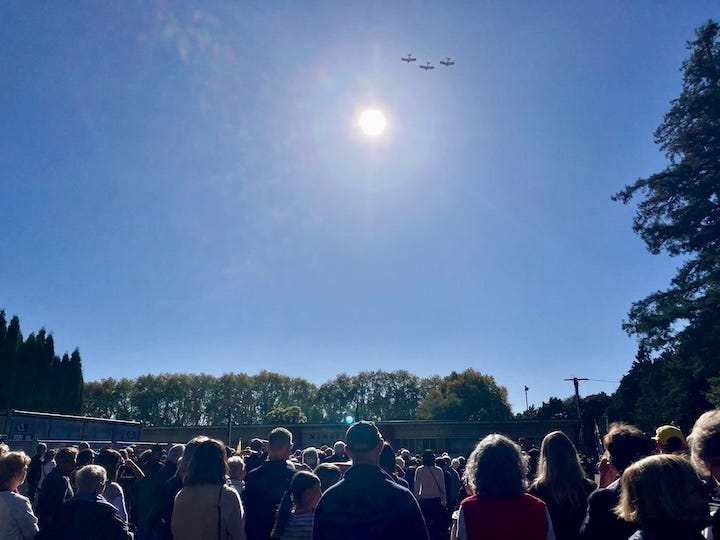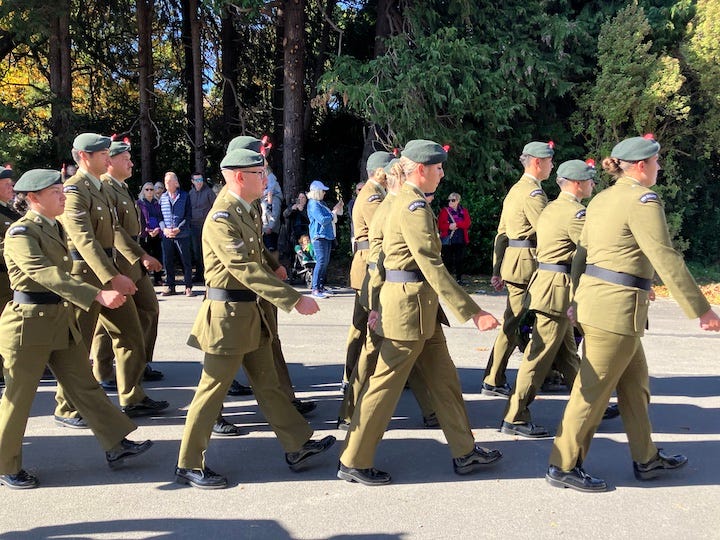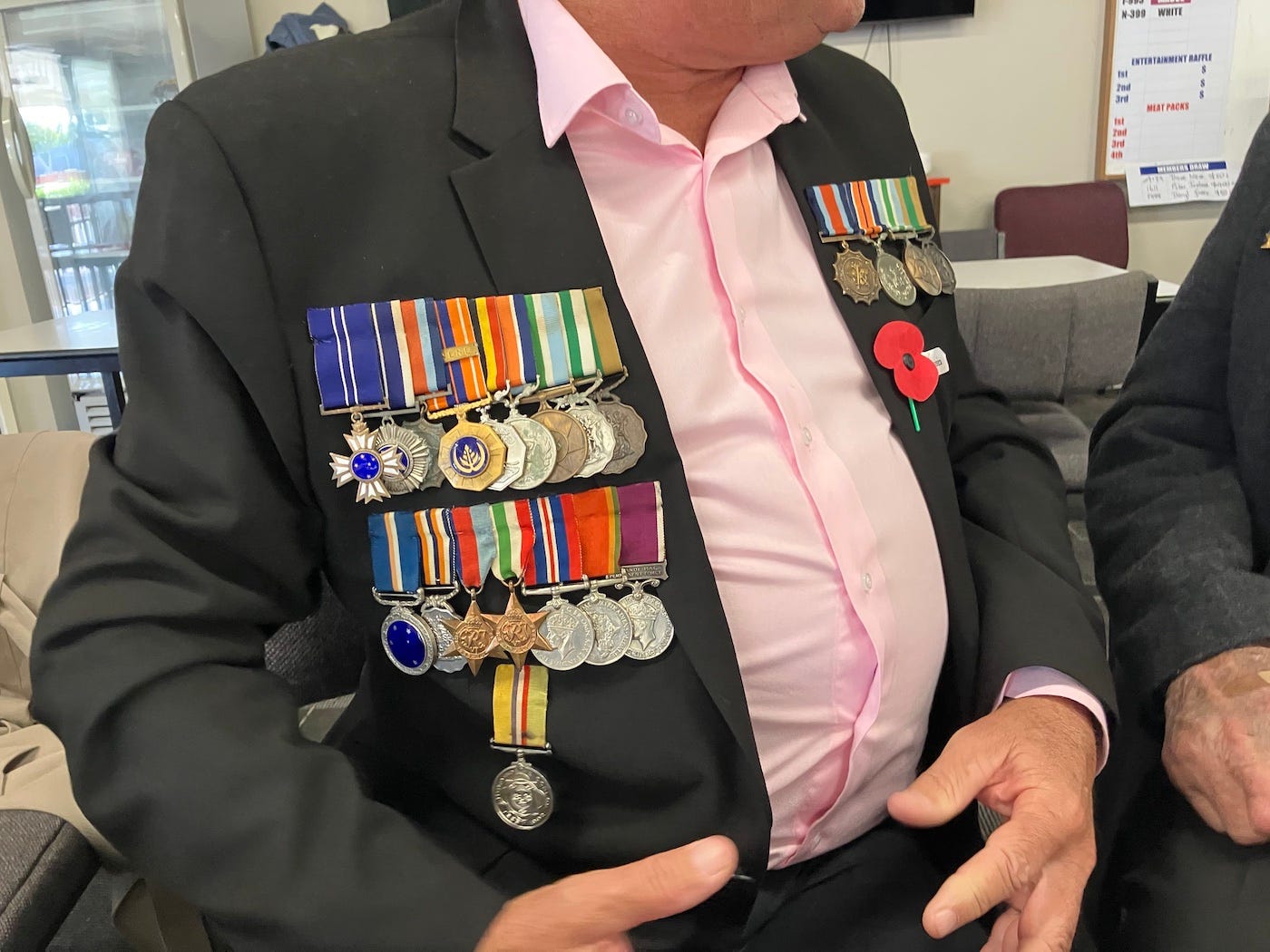On Anzac Day we gathered outside the Greytown swimming pool. That’s what we called it in summer, when we hop across the parking lot barefoot and dripping. Now we use its official name, the Greytown Memorial Baths. Now we stood in silence outside the locked gates to remember New Zealand’s battlefield dead.
There were no risers, no chairs, no stage for the speakers. Sometimes this country’s casual infrastructure tracks perfectly with its egalitarianism. We stood in perfect silence: a mate of mine alongside his dad on a mobility scooter, a mom from school pickup whose name escapes me, a playmate of my daughter’s with her great-grandfather’s medals pinned to her coat. Up front I could see two New Zealand flags—just the tops, with that stubborn Union Jack. Before them: a few hundred bowed heads, haloed in the island sun.
A band of pipers wheezed a lament. A local official spoke of boys who died a long way from home. There was no PA system. Didn’t need one, in the still morning air.
A buzzing in the skies: three biplanes in formation, taking a slow lap of Anzac Day ceremonies up and down the valley.
The speaker recited that famous poem of the Great War.
They shall not grow old, he said, and the biplanes disappeared into the sun.
I got chills. Who wouldn’t?
It’s a funny line, ain’t it. What is a nation but a community organized to shelter us as we grow old?
Dead boys are only romantic if they died defending a nation. That’s how they become our “ghostly national imaginings,” in Benedict Anderson’s phrase.
But nobody was shooting at New Zealand.
Let’s do the history. Anzac Day officially covers all New Zealanders lost in any war. But the most famous dead here are the dead of Gallipoli.
On April 25, 1915 the ANZAC forces—that’s the Australia and New Zealand Army Corps—were ordered into an ill-advised invasion of a Turkish beach at the distant, unfashionable end of World War I. The French were there, too, but it was mostly Brits and soldiers drawn from across their fading empire—Australia, still-colonized Ireland and India, even a not-yet-Canadian Newfoundland.
What were they all fighting for? In America the answer to this question is always FREEDOM. Here the actual motives behind Anzac Day are rarely discussed. Mother England, I suppose. The Kiwis came when called, and died in droves: 2,779 New Zealanders were lost on that beach before Team GB eventually retreated. There weren’t much more than a million New Zealanders total back then. Per capita that’s the equivalent of ten Gettysburgs, or a staggering 228 9/11s.
A national earthquake it was, one now widely credited with forging a New Zealand identity distinct from the very Brits and Aussies and Irish and Indians they died alongside. The Turks, who lost many more men in their victory, tell Gallipoli as a nation-building story, too. Atatürk himself was an officer in the battle.
But the Turks were defending their own land. Kiwis fought and died for an Empire halfway across the world—and yet came home with a greater sense of self.
The math is strange, but it checks out. Some emotions travel easily. Smiles are catching. Anger starts a fight. Grief, though, is strangely private. Grief turns us inward. Grief raises a flag and pulls up the drawbridge.
They shall grow not old, as we that are left grow old.
We’re lucky to grow old, Jenny and I.
Presently, we’re growing old in New Zealand.
How do we, as Americans, mourn this country’s honored dead?
Jenny says Anzac Day feels to her like going to the funeral of a friend’s parent. You’re not there for the body in the casket, you’re there for the friend. Your very presence acknowledges a memory you can’t access, a pain you can’t quite feel.
But who’s in the family, exactly?
The Commonwealthiness of Anzac Day is both delightful and utterly strange to an American. Those darn Union Jacks on the flag. The poem about not growing old—it’s English. The other poem, the one about Flanders Fields that inspires the red poppies you see everywhere this time of year—it’s Canadian. Those biplanes? New Zealand didn’t even have an Air Force during World War I. England gave them two planes in 1913, then took ‘em right back when the war broke out.
At the pub after the ceremony I met a South African wearing a chestful of his family’s own stars and crosses, including one his great-grandfather earned in the Boer War. At the next table a girl found a medal that had dropped to the floor. The Lancashire Fusiliers, her mother said. The mother’s Irish. She knew the famous English regiment’s hardware at a glance.
I had to look ‘em up. The Lancashire Fusiliers were at Gallipoli, too. Before that they spent literal centuries as the bleeding edge of the British Empire, kicking local ass around the world. At one point they were deployed to America. In 1777 they fought at the Battle of Saratoga, in present-day New York State. At Saratoga, the Lancashire Fusiliers surrendered to us.
All in the family, I suppose.
But these are strange days in the family.
Trump has flipped the table on everyone. The UK is watching the Special Relationship go poof. Canada’s gone rightfully elbows up. The New Zealand government is toadying up to the man, while Kiwis themselves flee to Australia.
The other day I read a letter I wrote about the America election to a room full of very smart Kiwi writers. I got to the end and just about wept. They get it, kinda? They read the news.
But I didn’t want them to get it. These are my ghosts.
I swallowed my tears. I kept my eyes fixed on the foreign carpet.
I mean, you wanna talk war dead? That guppy-faced Mississippi governor just fired up Confederate History Month again. It’s April, same as Gallipoli. April, the month the South finally gave up on its war to keep slaves. C’mon. Mississippi Goddam.
Out on the pub’s sunny deck I sat down with some young Kiwi friends of mine. They’re getting married in Vegas later this year. They’ve saved up for a big trip across America. We should’ve be talking Austin beergardens to visit, or the late-night bars of New Orleans.
But they read the news, too. The international travelers snatched out of pure spite and locked up in cells with those creepy foil blankets for a couple weeks. Commonwealth folks, too. A Canadian entrepreneur. A Welsh artist. Just a few random cases, we told ourselves. It’s gonna be fine, we said. It’s gonna be fine.
Then we changed the subject. It was too pretty a day to dwell on the future. //











